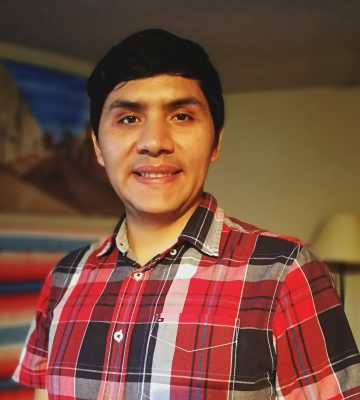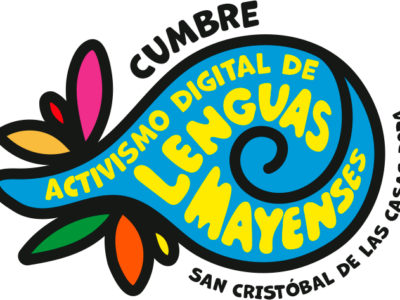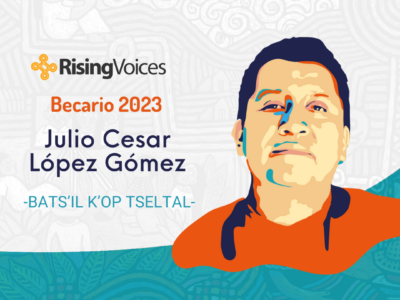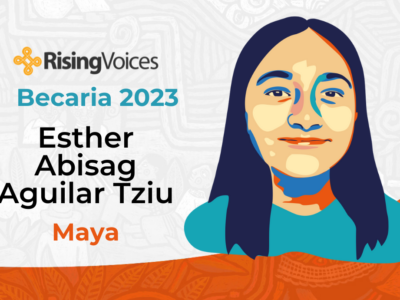
Photograph shared by Jermani Ojeda Ludeña
In 2020, we continue our social media campaign by inviting different hosts to manage the @ActLenguas (Language Activism) Twitter account and share their experiences with the revitalization of and advocacy for native languages. This profile post is about Jermani Ojeda Ludeña (@jermaniojeda) and what he plans to discuss during his week as a host.
Rising Voices (RV): Please tell us about yourself.
Mi nombre es Jermani Ojeda Ludeña, soy de la comunidad campesina Quechua de Puca Puca, distrito de Curahuasi, región Apurímac, Perú.
Soy estudiante de doctorado en Literaturas y Culturas Latinoamericanas e Ibéricas en la Universidad de Texas en Austin, Estados Unidos. Anteriormente fui académico visitante en la Universidad de Delaware en el que enseñé mi lengua materna que es el Quechua. Desde el espacio académico usando herramientas digitales enseño y busco visibilizar mi lengua materna y la presencia de indígenas Quechuas en diversos espacios académicos. He sido entrevistado en diversos medios de comunicación dando a conocer la importancia de no perder nuestra lengua materna e identidad en los ambientes académicos, esto debido a que el país de donde provengo existe un racismo lingüístico y cultural contra las poblaciones indígenas.
My name is Jermani Ojeda Ludeña, I am from the Quechua peasant community of Puca Puca, Curahuasi district, Apurímac region, Peru.
I am a PhD student in Latin American and Iberian Literatures and Cultures at the University of Texas at Austin, United States. I was previously a visiting scholar at the University of Delaware where I taught my native language, Quechua. Using digital tools, I teach and seek to make my mother tongue and the presence of Quechua indigenous people more visible in various academic spaces. In my interviews in various media, I have emphasized the importance of preserving our mother tongue and identity in academic settings, because in my home country of Peru there is linguistic and cultural racism against indigenous populations.
RV: What is the current status of your language on the internet and offline?
El idioma Quechua históricamente ha tenido diversas momentos de expansión y prohibición. En la colonia se usó inicialmente para evangelizar a las poblaciones indígenas pero tras la rebelión de Tupaq Amaru II se prohibió su uso.
Con el surgimiento de los nuevos estado-nación se profundizó la oficialización del uso del idioma Español en desmedro del Quechua y toda lengua indígena en el Perú. Esta nueva república se basó en la lógica de eliminación de todo rasgo indígena para mostrar una supuesta modernización del país, las víctimas de la modernización y el desarrollo fueron los pueblos indígenas y sobre todo sus lenguas. Sin embargo, un espacio alternativo para el uso de la lengua han sido los medios de comunicación tradicionales y últimamente las redes sociales. En el caso de medios tradicionales la radio jugó un rol muy importante desde la segunda mitad del siglo pasado donde los quechuahablantes encontraron un espacio para difundir la lengua y la cultura.
Con el surgimiento de las redes sociales como el Facebook, Instagram y Twitter, muchos Quechuas utilizaron estos espacios para enseñar la lengua y visibilizar la cultura Quechua. Mientras la lengua oficial en la educación, el comercio y el gobierno era el Español, en los medios de comunicación se ha tenido mayor libertad para su difusión. Los últimos 3 años se ha visto un inusitado movimiento de activistas del Quechua en las redes sociales como el Facebook, lo que permite avizorar con mucho optimismo el futuro de la lengua.
Historically, the Quechua language has passed through various situations of development and prohibition. During colonization, it was initially used to evangelize indigenous populations, but after the Tupaq Amaru II rebellion its use was prohibited.
With the emergence of the new nation-states, the official use of the Spanish language was strengthened to the detriment of Quechua and all indigenous languages in Peru. This new republic was based on the logic of eliminating all its indigenous aspects in order to show a supposed modernization of the country. But the victims of this modernization and development were the indigenous peoples, and especially their languages. However, an alternative space for the use of the language has been the traditional media and, lately, social networks. In the case of traditional media, since the second half of the last century, the radio has played a very important role as a space for Quechua speakers to promote their language and culture.
With the emergence of social networks such as Facebook, Instagram and Twitter, many Quechua people have used these spaces to teach their language and make the Quechua culture visible. While Spanish is the official language in education, commerce and government, the media has allowed greater freedom for its dissemination. The last three years have seen an unprecedented movement of Quechua activists on social networks such as Facebook, which makes us optimistic about the future of the language.
RV: On what topics do you plan to focus during the week that you’ll manage the @ActLenguas Twitter account?
Me enfocaré en visibilizar el uso de la lengua en los medios de comunicación tradicionales y en las redes sociales. Con especial énfasis en la labor de los quechuahablantes que desafiamos al estado-nación en el uso de su lengua que no es considerado al mismo nivel del Español por el gobierno. Hemos tenido hitos históricos en el posicionamiento del Quechua en los medios y quiero visibilizar ese hecho. Además, quiero mencionar el trabajo que junto a muchos activistas Quechuas estamos realizando como nueva generación de quechuahablantes que mostramos que nuestra lengua está presente y queremos preservarlo. Estaré compartiendo algunas producciónes audiovisuales de esta generación de Quechuas en las redes sociales por ejemplo.
I will focus on making the use of Quechua language visible in traditional media and on social media. I will emphasize the work of Quechua speakers who challenge the government of this nation-state which considers that the use of Quechua should not be at the same level of Spanish. We have achieved historical milestones in regards to the presence of Quechua language in the media, so I want to make this fact known. Also, I want to mention the work that, together with many Quechua activists, we are doing. They are a new generation of Quechua speakers who prove that we still use our language and we want to preserve it. I will be sharing some audiovisual productions made by Quechua speakers on social networks, for example.
RV: What are the main motivations for your digital activism, and your hopes for your language?
Mi activismo es por reclamar el derecho que tenemos a utilizar nuestras lenguas maternas en nuestros países. Si bien el Quechua ha sido oficializado en 1975, este hecho fue simbólico y no se tangibilizó en la realidad. Como dijo en algún momento el académico boliviano Xavier Albó, el Quechua es una lengua oprimida. Sueño que mi lengua en algún momento sea utilizada al mismo nivel que el Español, en la educación en todos los niveles, con respeto y sin discriminación a sus hablantes. Que en las escuelas, colegios y universidades se enseñe en Quechua. Este reconocimiento de la lengua permitirá ejercer el derecho que tenemos a nuestra lengua y mostrará el legado de nuestra cultura Quechua en los Andes de Sudamérica.
My aim is to claim our right to use our mother tongues in our countries. Although the Quechua language was made official in 1975, this fact was symbolic and did not become a reality. As the Bolivian academic Xavier Albó once said, Quechua is an oppressed language. I dream that some day my language will be used as Spanish is, at all levels of education, with respect and without its speakers being discriminated against. I hope that schools, colleges and universities will teach in Quechua. This recognition of the language will allow us to exercise our right to our language and will show the legacy of our Quechua culture in the Andes of South America.



